
Transit police are specialized police agencies employed either by a common carrier or a municipality, county, district, or state. Transit law enforcement services may also be provided by a specialized unit within a larger local law enforcement agency. Their mandate is to prevent and investigate all crime committed against the carrier or its passengers, as well as crime incidentally committed on – and sometimes around – the carrier's property.
Security police officers are employed by or for a governmental agency or corporations to provide security services to those properties.
Special police usually describes a police force or unit within a police force whose duties and responsibilities are significantly different from other forces in the same country or from other police in the same force, although there is no consistent international definition. A special constable, in most cases, is not a member of a special police force (SPF); in countries in the Commonwealth of Nations and often elsewhere, a special constable is a voluntary or part-time member of a national or local police force or a person involved in law enforcement who is not a police officer but has some of the powers of a police officer.
A Police Community Support Officer, or as written in legislation Community Support Officer is a uniformed member of police staff in England and Wales, a role created by Section 38(2) of the Police Reform Act 2002, which was given Royal Assent by Queen Elizabeth II on 24 July 2002. They are non-warranted but provided with a variety of police powers and the power of a constable in various instances by the forty-three territorial police forces in England and Wales and the British Transport Police.

York Region Transit (YRT) is the public transit operator in York Region, Ontario, Canada. Its headquarters are in Richmond Hill, at 50 High Tech Road.
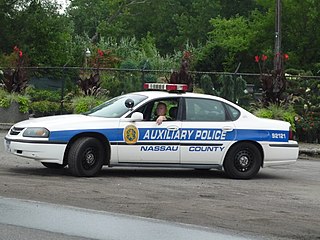
Auxiliary police, also called volunteer police, reserve police, assistant police, civil guards, or special police, are usually the part-time reserves of a regular police force. They may be unpaid volunteers or paid members of the police service with which they are affiliated.
A law enforcement officer (LEO), or peace officer in North American English, is a public-sector or private-sector employee whose duties primarily involve the enforcement of laws, protecting life & property, keeping the peace, and other public safety related duties. Law enforcement officers are designated certain powers & authority by law to allow them to carry out their responsibilities.
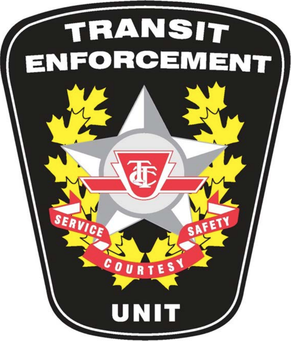
The Transit Enforcement Unit is a special constabulary maintained by the Toronto Transit Commission (TTC) in Toronto, Ontario, Canada. First established in 1997, the Unit consists of special constables and provincial offences officers, referred to internally as transit fare inspectors. The unit's special constables have the full powers of a police power on or in relation to TTC property, and, as of 2023, the unit employs 101 special constables out of an authorized complement of 145.

The York Regional Police (YRP) is the police service of the Regional Municipality of York, Ontario, Canada. YRP was formed in 1971 from the police forces maintained by the nine municipalities which amalgamated into York Region at the time. The force had a strength of over 1,500 sworn members and 618 unsworn members as of 2015.

The Ottawa Police Service is a municipal police force in Ottawa, Ontario, Canada. The OPS serves an area of 2,790 square kilometres and 1,017,449 people alongside several other police forces which have specialized jurisdiction.
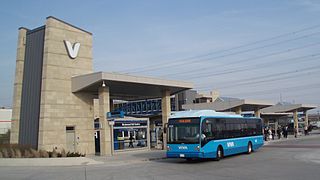
Viva is the bus rapid transit operations of York Region Transit in York Region, Ontario, Canada. Viva service forms the spine for YRT's local bus service, providing seamless transit service across York Region with connections to northern Toronto.
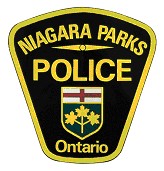
The Niagara Parks Police Service is a special constabulary maintained by the Niagara Parks Commission in Niagara Falls, Niagara-on-the-Lake and Fort Erie, Ontario, Canada. Established in 1887, the Niagara Parks Police Service has a unique status among Ontario special constabularies in that its members are armed and trained at the Ontario Police College. As special constables, Parks Police officers only have authority on or in relation to property owned by the Niagara Parks Commission, in contrast to municipal or provincial police officers, who have authority province-wide.

Wandsworth Parks and Events Police is a Wandsworth Borough Council service responsible for the routine patrolling of the parks, commons, and open spaces within the London Borough of Wandsworth, which has more green spaces than any other inner London borough. It also enforces byelaws, dog control orders, and other park regulations, and provides policing for special events. Its lineage may be traced to a 1984 foundation, although the present body dates from 2012, and was rebranded in 2015 with its current name and responsibilities.

Law enforcement in Canada is the responsibility of police services, special constabularies, and civil law enforcement agencies, which are operated by every level of government, some private and Crown corporations, and First Nations. In contrast to the United States or Mexico, and with the exception of the Unité permanente anticorruption in Quebec and the Organized Crime Agency of British Columbia, there are no organizations dedicated exclusively to the investigation of criminal activity in Canada. Criminal investigations are instead conducted by police services, which maintain specialized criminal investigation units in addition to their mandate for emergency response and general community safety.
Auxiliary constables or reserve constables are unpaid citizens in Canada who volunteer their time and skills to a police force. They are uniformed, unarmed members who perform a similar role to their UK counterparts in the Special Constabulary. Their main function is to supplement the police force with additional manpower, with duties varying by appointment, geographical location and the needs of the specific detachment/department.

Transit Officers were the security and fare compliance function for RailCorp train services in New South Wales, Australia. Transit Officers conducted uniformed and plainclothes patrols on CityRail and CountryLink train services and assigned to ensure the security of passengers, staff and rail property. The position was created in 2002 after a report found that rail security required more authority than possessed by the Chubb Security security guards contracted by RailCorp. Previous figures showed that over 600 Transit Officers had been engaged, however the number was reduced to 150.

National Police Corps, colloquially in English as Dutch National Police or National Police Force, is divided in ten regional units, a central unit, the police academy, police services center, and national dispatch center cooperation. The law-enforcement purposes of these agencies are the investigation of suspected criminal activity, referral of the results of investigations to the courts, and the temporary detention of suspected criminals pending judicial action. Law enforcement agencies, to varying degrees at different levels of government and in different agencies, are also commonly charged with the responsibilities of deterring criminal activity and preventing the successful commission of crimes in progress. The police commissioner in the Netherlands is Henk van Essen since May 1, 2020.
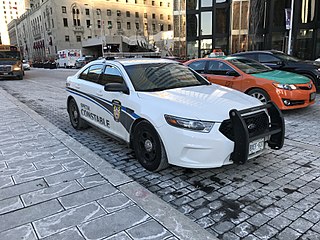
A special constable or special police constable can refer to an auxiliary or part-time law enforcement officer or a person who is granted certain (special) police powers.














